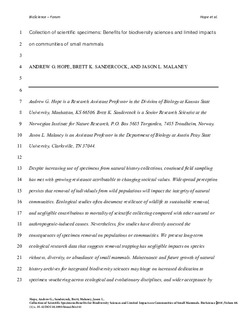Collection of Scientific Specimens:Benefits for Biodiversity Sciences and Limited Impacts on Communities of Small Mammals
Journal article, Peer reviewed
Accepted version

Åpne
Permanent lenke
http://hdl.handle.net/11250/2477575Utgivelsesdato
2018Metadata
Vis full innførselSamlinger
- Publikasjoner fra CRIStin - NINA [2364]
- Scientific publications [1392]
Sammendrag
Despite increasing use of specimens from natural-history collections, continued field sampling has met with growing resistance attributable to changing societal values. Widespread perception persists that the removal of individuals from wild populations will affect the integrity of natural communities. Ecological studies often document the resilience of wildlife to sustainable removal and the negligible contributions to mortality of scientific collecting compared with those of other natural or anthropogenic-induced causes. Nevertheless, few studies have directly assessed the consequences of specimen removal on populations or communities. We present long-term ecological research data that suggest removal trapping has negligible impacts on the species richness, diversity, or abundance of small mammals. The maintenance and future growth of natural-history archives for integrated biodiversity sciences may hinge on increased dedication to specimen vouchering across ecological and evolutionary disciplines and wider acceptance by regulatory authorities and funding agencies. The effects of low-intensity collecting should be investigated for other taxa and across biomes. community ecology, long-term research, museum voucher, natural-history collections, removal trapping